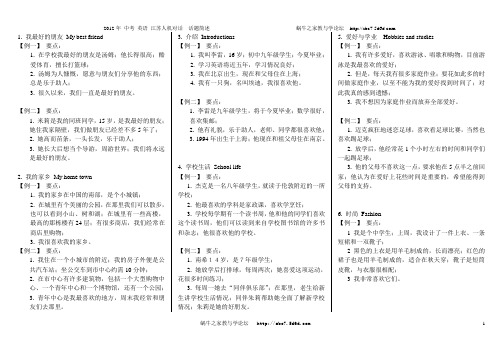人机对话话题简述 作文40篇
- 格式:ppt
- 大小:121.00 KB
- 文档页数:41

话题简述1-1第一次见面,英国人通常会说“你好”或者“很高兴见到你”,与你握手。
在公共场合,他们举止得体,他们认为插队是无礼行为,他们总是排队;在家中他们也非常有礼貌。
入乡随俗,当我们在一个陌生的地方,我们的行为举止应当像当地人一样。
1-2我们能在很多地方,比如医院、博物馆、街道、公园见到各类公共标志。
他们通常颜色鲜明,用图形表达。
大多数公共标志能给我们提供有用的信息。
它们能帮我们找路,告诉我们周围的地点;它们提醒我们远离危险,告诫我们不能做某事,比如,在艺术博物馆里我们总能看到“禁止拍照”的标志。
2-1谭盾1958年出生在中国湖南省中部;很小的时候就表现出对音乐的兴趣;对他而言,最好的音乐来自;由于他喜欢大自然的声音,他经常在自己的音乐里使用它们。
谭盾成功的把中国音乐和西方音乐融入在一起,在东西方之间架起了一座桥梁;用他自己的话讲,“我的音乐就是梦想无边。
”2-2谭盾是当今世界最伟大的艺术家之一;他在年轻的时候就用石头、纸张等常见的物品来制作音乐。
他喜欢来自大自然的声音;他经常在自己的音乐中使用它们。
比如,在他的一部作品《水乐》中,它没有使用任何乐器;通过控制水流的速度,他用水制造出了五十多种声音;那真是太神奇了!3-1我喜欢看罗伯特-路易斯-史蒂文森的书,我认为它们真的太精彩了;比如,《金银岛》讲述的是一个小男孩的故事;他出海航行,寻找宝藏;故事给了我很大的信心;读完这本书后,我不在像以前那样害羞;将来我还想去旅游,拥有一些令人兴奋的经历。
3-2我喜欢阅读;每周我花七个小数阅读各种类型的书;我对历史题材的书感兴趣,但是我爱看小说。
朋友们给我很多读书建议;我们常见面,讨论读什么书。
阅读总是段美好的时光;好书让我忙碌一天之后轻松下来;同时也向我打开了一个全新的世界。
4-1人人喜欢大熊猫,大熊猫温顺且安静,吃一种特别的竹子。
野外现仅有大约1600只大熊猫,它们的数目越来越少。
大熊猫生活的地方正在变为农田。

1. 我最好的朋友My best friend【例一】要点:1. 在学校我最好的朋友是汤姆;他长得很高;酷爱体育,擅长打篮球;2. 汤姆为人慷慨,愿意与朋友们分享他的东西;总是乐于助人;3. 很久以来,我们一直是最好的朋友。
【例二】要点:1. 米莉是我的同班同学,15岁,是我最好的朋友;她住我家隔壁,我们做朋友已经差不多5年了;2. 她高而苗条,一头长发,乐于助人;3. 她长大后想当个导游,周游世界;我们将永远是最好的朋友。
2. 我的家乡My home town【例一】要点:1. 我的家乡在中国的南部,是个小城镇;2. 在城里有个美丽的公园,在那里我们可以散步,也可以看到小山、树和湖;在城里有一些高楼,最高的那栋楼有24层;有很多商店,我们经常在商店里购物;3. 我很喜欢我的家乡。
【例二】要点:1. 我住在一个小城市的附近;我的房子外便是公共汽车站;坐公交车到市中心约需10分钟;2. 在市中心有许多建筑物,包括一个大型购物中心、一个青年中心和一个博物馆,还有一个公园;3. 青年中心是我最喜欢的地方,周末我经常和朋友们去那里。
3. 介绍Introductions【例一】要点:1. 我叫李雷,16岁;初中九年级学生;今夏毕业;2. 学习英语将近五年,学习情况良好;3. 我在北京出生,现在和父母住在上海;4. 我有一只狗,名叫埃迪,我很喜欢他。
【例二】要点:1. 李雷是九年级学生,将于今夏毕业;数学很好,喜欢集邮;2. 他有礼貌,乐于助人,老师、同学都很喜欢他;3. 1994年出生于上海;他现在和祖父母住在南京。
4. 学校生活School life【例一】要点:1. 杰克是一名八年级学生,就读于伦敦附近的一所学校;2. 他最喜欢的学科是家政课,喜欢学烹饪;3. 学校每学期有一个读书周,他和他的同学们喜欢这个读书周,他们可以读到来自学校图书馆的许多书和杂志;他很喜欢他的学校。
【例二】要点:1. 南希14岁,是7年级学生;2. 她放学后打排球,每周两次;她喜爱这项运动,花很多时间练习;3. 每周一她去“同伴俱乐部”;在那里,老生给新生讲学校生活情况;同伴朱莉帮助她全面了解新学校情况;朱莉是她的好朋友。

人机对话:探索英语学习的未来In the rapidly advancing world of technology, the integration of artificial intelligence (AI) into education has become a trend that cannot be ignored. This integration is particularly evident in the realm of English language learning, where human-machine dialogue has emerged as a cutting-edge teaching method. This article explores the potential benefits and challenges of this innovative approach to English learning.The concept of human-machine dialogue in English learning is based on the use of AI-powered language models to simulate real-life conversational exchanges. These models, trained on vast amounts of language data, can understand and respond to human speech, enabling learners to engage in meaningful dialogue and improve their language skills through interaction.One of the key benefits of human-machine dialogue in English learning is its ability to provide personalized learning experiences. Unlike traditional classroom settings where teachers often have to cater to the needs of a diverse student population, AI-based dialogue systems canadapt to the unique learning styles and abilities of individual learners. This personalization ensures that each student receives targeted feedback and practiceopportunities that are tailored to their specific needs, thereby enhancing their learning outcomes.Another significant advantage of human-machine dialogue is its convenience and accessibility. With the widespread availability of smart devices and the internet, learnerscan engage in language practice anytime, anywhere. This flexibility removes geographical and time constraints, making it easier for students to fit language learning into their daily schedules.However, while the potential of human-machine dialoguein English learning is immense, it also presents some challenges. One such challenge is the issue of authenticity. While AI-powered dialogue systems can simulate conversational exchanges, they lack the emotional and cultural nuances that are essential for effective communication in real-life settings. This can limit the effectiveness of the learning experience, as learners maynot be exposed to the full range of linguistic and cultural variations that they would encounter in actual conversation. Moreover, the reliance on AI-based dialogue systems may also lead to a decrease in human interaction. Language learning is not just about acquiring vocabulary and grammar rules; it is also about developing social skills andcultural understanding through interaction with other humans. Excessive reliance on machines for conversation may rob learners of these valuable human interactions,potentially hindering their overall language proficiency.In conclusion, human-machine dialogue represents a promising new frontier in English language learning. Its ability to provide personalized learning experiences and convenient access to language practice offers significant benefits to learners. However, it is important to recognize the limitations of this approach and ensure that it is used as a complement to, rather than a replacement for,traditional human interaction. By balancing the use of AI-based dialogue systems with real-life conversational practice, learners can harness the power of technology to enhance their English learning journey while maintainingthe social and cultural dimensions that are crucial to language proficiency.**人机对话:探索英语学习的未来**随着科技的飞速发展,人工智能(AI)在教育领域的融合已成为不可忽视的趋势。

初中人机对话材料英语作文A: Hey, what's up?B: Not much, just chilling. How about you?A: I'm good, thanks for asking. Did you finish the math homework?B: Yeah, I did it last night. It was kind of tricky though.A: I know, right? I had to ask my mom for help.A: Hey, did you see the new Spiderman movie?B: Yeah, I saw it last weekend. It was so awesome!A: I know, the special effects were mind-blowing.B: And the plot was really exciting too.A: Have you decided what to do for the school talent show?B: Yeah, I'm thinking of doing a magic trick. What about you?A: I'm still not sure. Maybe I'll just sing a song or something.B: That sounds cool. I can't wait to see everyone's performances.A: Do you want to grab some lunch after school?B: I can't, I have to go to my piano lesson.A: Oh, right. Maybe we can hang out this weekend then.B: Definitely, I'm free on Saturday.A: I heard there's going to be a new student joiningour class next week.B: Yeah, I heard about that too. I wonder where they're from.A: I hope they'll be nice and we can make them feel welcome.B: Yeah, that would be great. It's always nice to have new friends.。


初三英语人机对话作文模板人机对话是指人类与机器之间进行交流和对话的过程。
在现代社会,人机对话已经成为一种普遍的交流方式,它可以在各种场合得到应用,比如在商业、教育、医疗等领域。
人机对话的发展已经成为了人工智能领域的一个热点话题。
下面是一个初三英语人机对话的范例:人,Hello, can you help me with my English homework?机,Of course! I'd be happy to help. What do you need assistance with?人,I need to write a composition about my summer vacation. Can you give me some ideas on how to start?机,Sure. You can start by introducing where you went for your summer vacation and what you did there. For example, "During my summer vacation, I went to the beach with my family. We spent our days swimming, building sandcastles, and enjoying the sunshine."人,That's a good start. What else should I include in my composition?机,You can also talk about the people you spent your vacation with, the food you ate, and any interesting or memorable experiences you had. Try to include descriptive details to make your composition more engaging for the reader.人,That's helpful. Thank you for the suggestions. Do you have any tips for improving my English writing skills?机,One way to improve your writing skills is to read more in English. This will help you become more familiar with the language and expand your vocabulary. You can also practice writing regularly and ask for feedback from your teachers or peers.人,I will definitely try that. Thanks for your help!机,You're welcome. If you have any more questions or need further assistance, feel free to ask.人,I will. Thanks again!以上对话是一个典型的人机对话范例。
1. 我最好的朋友 My best friend【例一】要点:1. 在学校我最好的朋友是汤姆;他长得很高;酷爱体育,擅长打篮球;2. 汤姆为人慷慨,愿意与朋友们分享他的东西; 总是乐于助人;3. 很久以来,我们一直是最好的朋友。
【例二】要点:1. 米莉是我的同班同学, 15岁, 是我最好的朋友; 她住我家隔壁,我们做朋友已经差不多 5年了;2. 她高而苗条,一头长发,乐于助人;3. 她长大后想当个导游,周游世界;我们将永远是最好的朋友。
2. 我的家乡 My home town【例一】要点:1. 我的家乡在中国的南部,是个小城镇;2. 在城里有个美丽的公园, 在那里我们可以散步, 也可以看到小山、树和湖;在城里有一些高楼, 最高的那栋楼有 24层;有很多商店,我们经常在商店里购物;3. 我很喜欢我的家乡。
【例二】要点:1. 我住在一个小城市的附近;我的房子外便是公共汽车站;坐公交车到市中心约需 10分钟;2. 在市中心有许多建筑物,包括一个大型购物中心、一个青年中心和一个博物馆,还有一个公园; 3. 青年中心是我最喜欢的地方,周末我经常和朋友们去那里。
3. 介绍 Introductions【例一】要点:1. 我叫李雷, 16岁; 初中九年级学生; 今夏毕业;2. 学习英语将近五年,学习情况良好;3. 我在北京出生,现在和父母住在上海;4. 我有一只狗,名叫埃迪,我很喜欢他。
【例二】要点:1. 李雷是九年级学生,将于今夏毕业;数学很好,喜欢集邮;2. 他有礼貌,乐于助人,老师、同学都很喜欢他;3. 1994年出生于上海; 他现在和祖父母住在南京。
4. 学校生活 School life【例一】要点:1. 杰克是一名八年级学生, 就读于伦敦附近的一所学校;2. 他最喜欢的学科是家政课,喜欢学烹饪;3. 学校每学期有一个读书周, 他和他的同学们喜欢这个读书周,他们可以读到来自学校图书馆的许多书和杂志;他很喜欢他的学校。
初中英语听力口语自动化考试训练材料第二部分话题简述根据所给的话题和内容要点介绍情况1. 学校生活School life例一要点:1. 杰克是一名八年级学生,就读于伦敦附近的一所学校。
2. 他最喜欢的学科是中文,他认为学习外语很有趣。
3. 学校每学期有一个“读书周”,他和他的同学们喜欢这个“读书周”,他们可以读到学校图书馆的许多书和杂志。
他很喜欢他的学校。
Jack is a Year 8 student at a school near London. His favourite subject is Chinese. He thinks learning foreign languages is fun. His school has a Reading Week every term. Jack and his classmates love it. They can read many books and magazines from the school library. Jack loves his school very much.例二要点:1. 南希14岁,是七年级学生。
2. 她每周放学后打两次排球。
她喜爱这项运动,花很多时间练习。
3. 每周一南希去“同伴俱乐部”,在那里,老生给新生讲学校生活情况;她的同伴朱莉帮助她全面了解新学校情况。
朱莉是她的好朋友。
Nancy is 14 years old. She’s in the seventh grade. Twice a week, she plays volleyball after school. She loves this game and spends a lot of time practising. Every Monday, Nancy goes to a Buddy Club. There, older students talk to new students about school life. Her buddy Julie helps her learn all about her new school. Julie is her good friend.2. 爱好与学业Hobbies and studies例一要点:1. 我有许多爱好,喜爱游泳、唱歌和购物,目前旅游是我的最爱。
初中英语听力口语自动化考试训练材料第二部分话题简述根据所给的话题和内容要点介绍情况1. 学校生活School life例一要点:1. 杰克是一名八年级学生,就读于伦敦附近的一所学校。
2. 他最喜欢的学科是中文,他认为学习外语很有趣。
3. 学校每学期有一个“读书周”,他和他的同学们喜欢这个“读书周”,他们可以读到学校图书馆的许多书和杂志。
他很喜欢他的学校。
Jack is a Year 8 student at a school near London. His favourite subject is Chinese. He thinks learning foreign languages is fun. His school has a Reading Week every term. Jack and his classmates love it. They can read many books and magazines from the school library. Jack loves his school very much.例二要点:1. 南希14岁,是七年级学生。
2. 她每周放学后打两次排球。
她喜爱这项运动,花很多时间练习。
3. 每周一南希去“同伴俱乐部”,在那里,老生给新生讲学校生活情况;她的同伴朱莉帮助她全面了解新学校情况。
朱莉是她的好朋友。
Nancy is 14 years old. She’s in the seventh grade. Twice a week, she plays volleyball after school. She loves this game and spends a lot of time practising. Every Monday, Nancy goes to a Buddy Club. There, older students talk to new students about school life. Her buddy Julie helps her learn all about her new school. Julie is her good friend.2. 爱好与学业Hobbies and studies例一要点:1. 我有许多爱好,喜爱游泳、唱歌和购物,目前旅游是我的最爱。
Topic 1-1 School life中文提示:1. 杰克是一名八年级学生,就读于伦敦附近的一所学校。
2. 他最喜欢的学科是中文,他认为学习外语很有趣。
3. 学校每学期有一个“读书周”,他和他的同学们喜欢这个“读书周”,他们可以读到学校图书馆的许多书和杂志。
他很喜欢他的学校。
英文部分:Jack is a Year 8 student at a school near London. His favourite subject is Chinese. He thinks learning foreign languages is fun. His school has a Reading Week every term. Jack and his classmates love it. They can read many books and magazines from the school library. Jack loves his school very much.Topic 1-2 School life中文提示:1. 南希14岁,是七年级学生。
2. 她每周放学后打两次排球。
她喜爱这项运动,花很多时间练习。
3. 每周一南希去“同伴俱乐部”,在那里,老生给新生讲学校生活情况;她的同伴朱莉帮助她全面了解新学校情况。
朱莉是她的好朋友。
英文部分:Nancy is 14 years old. She’s in the seventh grade. Twice a week, she plays volleyball after school. She loves this game and spends a lot of time practising. Every Monday, Nancy goes to a Buddy Club. There, older students talk to new students about school life. Her buddy Julie helps her learn all about her new school. Julie is her good friend.Topic 2-1 Hobbies and studies中文提示:1. 我有许多爱好,喜爱游泳、唱歌和购物,目前旅游是我的最爱。